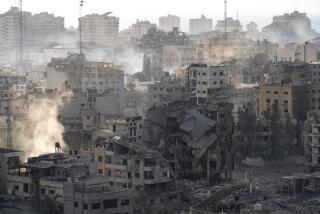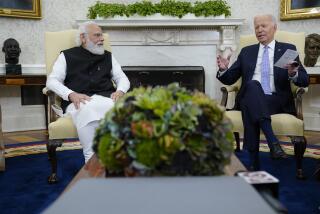Bhutto’s call to stop clash of civilizations
- Share via
There’s a Shakespearean quality to the late Benazir Bhutto’s life, but if you scour the Bard’s tragedies for an appropriate epitaph, the mind tends to settle on “Nothing is, but what is not.”
It’s no accident that the most ambivalent -- indeed, sinister -- line from “Macbeth” commends itself. The play is, after all, one of the canon’s greatest tales of impacted ambition, betrayal and convoluted deceit. It is, in other words, rather like the political history of wretched Pakistan, which, according to Bhutto, “today is the most dangerous place in the world,” not least because it is both unstable and nuclear-armed.
Bhutto was twice her country’s prime minister (1988-1990 and 1993-1996) and had returned from involuntary exile to campaign for a third term when she was assassinated in December. Her killers were Islamic extremists, though many believe they were abetted by the country’s notorious security forces. Political killings are woven through Pakistani history like a bright red thread, though the weaver’s hand usually is obscure. Bhutto’s father, Zulfikar Ali Bhutto -- also a “populist” prime minister -- was executed by the general who overthrew him. One of her brothers was poisoned; another was shot dead by persons unknown in 1996. She blamed the security forces; others believed her own husband, the notoriously corrupt Asif Ali Zardari, was involved.
“Reconciliation: Islam, Democracy, and the West” was finished just two days before the Harvard- and Oxford-educated Bhutto, 55, was killed. Her name is alone on the title page, though a “reader’s note” by her longtime friend and advisor, Washington political consultant and lobbyist Mark A. Siegel, indicates that he collaborated on the manuscript. In any case, the book is -- like the woman -- alternately fascinating, frustrating and opaque in a dodgy sort of way.
Tumult in Pakistan
In part, it’s a story of Bhutto’s return and the campaign that followed. In part, it’s a fragmentary account of her years preparing for and exercising power in a tumultuous Muslim state. Bhutto’s account of these events is, at best, fragmentary and selective. She campaigned -- and presents herself in “Reconciliation” -- as a modernizing, reasonably secular democrat, and so she was.
However, she also was prime minister when fateful connections were made between Pakistan’s powerful, shadowy Inter-Services Intelligence (ISI) group and the militantly fundamentalist Jamiat-ul-Ulema-e-Islam and the Afghan Taliban. During her first term, she approved a plan by an ambitious general who ultimately would become president and her chief political rival, Pervez Musharraf, to unleash the fanatic Lashkar-e-Talib militia against the Indians in Kashmir.
Over the years, Bhutto told various stories about her role in the decision to link Pakistani military and intelligence policies to militant Islam. As a Western-educated female leader, she was anathema to her military’s new clients -- indeed, they would one day kill her -- but the degree of her enthusiasm for the connections at their inception remains unclear. She later would say that unscrupulous and fundamentalist elements in the Pakistani intelligence service allowed, even encouraged, the groups to slip beyond control for their own purposes. While it’s true that it’s always dangerous for a lady to mount a tiger, the precise record remains unclear.
Bhutto’s record is strewn with such ambiguities. She was, by her own words -- and many of her actions -- a convinced democrat with a populist bent for grass-roots development. Yet she came from a vast, aristocratic family that still holds actual -- not virtual -- feudal sway over large parts of Sindh province. Moreover, she inherited leadership of her Pakistan Peoples Party as a legacy from her father, and her will specified that her mantle was to pass to her husband. He since has stepped aside -- for their son, 19-year-old Bilawal, currently at Oxford. Most democratic parties don’t work quite that way. Her commitment to education and development is well documented, yet corruption was a factor both times she was forced from office. Her husband earned the nickname “Mr. Ten Percent.”
Nothing is, but what is not.
More tolerant Islam
The most interesting part of Bhutto’s book is her argument with Samuel Huntington and the rest of the “Clash of Civilizations” crowd, who said that a confrontation between the West and militant Islam was inevitable after the Cold War was resolved. Historical inevitability always is a dicey prospect, but Bhutto goes well beyond the typical responses by Muslim political leaders. She argues that a substantial part of the work to be done to avoid such a clash must occur in the Islamic world, where a case needs to be made forcefully for more tolerant strains of Islam that are friendly to modernism and civil society. It says something about the state of affairs in the Islamic world that this is a daring, even singular, position for a political leader to take.
That said, Bhutto’s contention that Islam is inherently democratic and innately sympathetic to political democracy is a bit of a stretch. Turkey is the only (fitfully) functioning democracy in the Islamic world, and there the heirs to Ataturk’s iron-fisted secularism are fighting a rear-guard action. Bhutto cites Jordan and Yemen as democratic successes, but that’s a bit of a stretch as well. Similarly, her categorical assertion that development and education are antidotes to Islamic fundamentalism ignores the fact that the most virulent jihadis appear to come from educated, middle- and upper middle-class families. (Consider the Sept. 11 hijackers.) Bhutto’s argument for a program of scholarships enabling Muslim students to study in the West neglects to take into account that Khled Sheikh Mohammed, Al Qaeda’s 9/11 mastermind, and Sayyid Qutb, a founder of the Muslim Brotherhood and ideological godfather to contemporary jihadism, both were educated in the United States -- and went away our implacable enemies.
Bhutto obviously was right to assert that the West cannot treat conflict with the Islamic world as inevitable. Like every form of hopelessness, that’s a destructive -- and self-defeating -- idea. It will take more than simple goodwill and a talismanic invocation of “democracy” to make it otherwise, however. There is a place to begin the discussion, however. It’s with an observation and question:
Every economically significant Western country now is home to a substantial Muslim minority, pursuing their lives and practicing their religion according to the dictates of their individual consciences. Not a single Islamic nation is home to a substantial Jewish or Christian minority, though historically many were.
Why?
More to Read
Sign up for Essential California
The most important California stories and recommendations in your inbox every morning.
You may occasionally receive promotional content from the Los Angeles Times.










